Presentación
¡Hola! ¿Cómo estás?
Mi nombre es Carlos Cateb, tengo 64 años, y de estos 35 trabajé con Cardiopatías Fetales y Pediátricas junto a mi esposa, la Dra. Lilian Lopes, especialista en ambas materias. También junto a ella, soy socio de ECOKID, una clínica de renombre nacional que se ha establecido en el mercado hace 28 años. Hago este contacto para presentar el proyecto “En el corazón de Brasil – Corazones Fetales y Pediátricos”, que tiene como objetivo extender el acceso a la salud cardíaca a niños, mujeres embarazadas y adultos con cardiopatías congénitas en comunidades indígenas, que hoy están al margen de esta atención.
Sabemos que de cada 100 niños nacidos vivos, 1 tiene cardiopatías congénitas y que el diagnóstico precoz interfiere directamente con las posibilidades de tratamiento y, en consecuencia, con la supervivencia y calidad de vida de este niño. Los avances en cirugía cardíaca pediátrica y otros tratamientos disponibles han impactado profundamente el manejo de estos casos en los últimos años, aumentando enormemente la esperanza de vida de estos niños, que hoy llegan a la edad adulta en su gran mayoría y lo hacen con buena calidad de vida. Esta nueva realidad aún no se extiende a grupos que, en todo Brasil, permanecen sin acceso a una evaluación cardíaca o a pruebas diagnósticas, como un ecocardiograma.


Inicio del proyecto
Para empezar, elegimos una comunidad indígena llamada Kyikatêjê, del pueblo Gavião. Esta comunidad pertenece a la Tierra Indígena Mãe Maria (Tl), ubicada en el Sudeste del Estado de Pará (PA), ciudad de Marabá.

Proyecto
Un equipo compuesto por 3 médicos y una enfermera me acompañará a las comunidades indígenas para realizar atención cardiológica fetal (en embarazadas) y pediátrica (en niños de O a 15 años), así como exámenes de ecocardiografía y electrocardiografía, con el fin de diagnosticar posibles cardiopatías congénitas.

La razón para esta elección
Seleccionamos especialmente TI Mãe Maria porque tiene una característica interesante. Hay aproximadamente 22 comunidades con cerca de 2.500 indígenas, repartidas en 67.000 hectáreas de la selva amazónica. Todos con sus propias rutinas y órdenes (jefes y líderes). También haremos el sentido de cuántos niños de O a 15 años viven en cada aldea individualizada).El acceso a las comunidades no será un problema, ya que estoy bautizado como Halcón y por lo tanto me considero uno de ellos.
Project Development
Our team plans to travel to indigenous communities to perform cardiology exams on pregnant women and children. To accomplish this, we will bring two portable echocardiography machines and an electrocardiogram, along with three doctors and a nurse. We have already received all the necessary donations for the pilot project, but we still require additional donations for the next excursions that will take place every other month
- Three to four airline tickets, with prices ranging from approximately R$ 1,800 to R$ 2,500 each;
- Daily fee for the echocardiography specialist, which ranges from R$800 to R$4,000 per day depending on the number of days needed to perform the exams;
- Daily fee for a nurse or nursing assistant, which ranges from R$ 300 to R$ 1,500 per day;
- The approximate cost for each trip will be R$ 25,500;
- I will participate at every action, covering my own expenses.When Dr. Lilian Lopes participates of the actions, she will also cover her expenses, waiving the daily fees and tickets;
- Equipment insurance, leases, expenses with luggage dispatches and a series of other expenses;
- The government will cover internal transportation to the villages, whether by plane, boat, or 4x4 vehicle, ensuring safety and meals for our team.
Thank you for your attention. Let’s work towards a healthier Brazil!
Scan the QR code
on the side for
any questions.
YOU CAN DONATE AS MUCH AS YOU HAVE OR AS MUCH AS YOU WANT!
Dollar reference BRL 5.10


ARE YOU A DOCTOR?
Sign up in the form below to understand how you can help the project and be part of this cause!
ARE YOU A COMPANY OR INDIVIDUAL?
Help us raise funds to encourage the project and make a difference in the world!

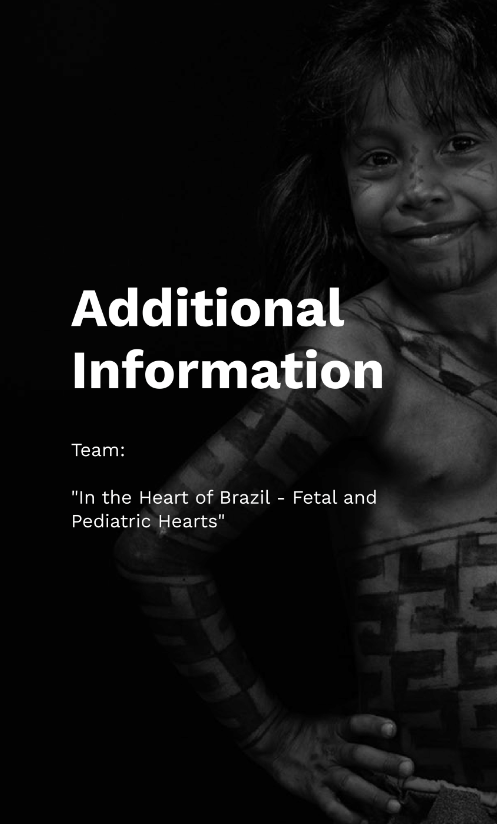
Medical Coordination:
Dra. Lilian Lopes
Dra. Glaucia Moreira
Dr. Fabrício Camargo
Organization:
Carlos Cateb
Medical Team**
Dra. Amanda Regina Camboim
Dra. Ana Gabriela Zandonaide
Dra. Heloísa Maria Khader
Nursing Assistant:
Darlyng Fabiana
Hakakwyigavia Haraxare
Non-Medical Coordination:
Concita Konxarti
Hakakwyi Haraxare
Pytàwà Warhyti Tembé
Carlos Cateb
Nurse Responsible:
Anne Cleria
Support:
Dra. Karen Gamboa
Secretary:
Aline Pinto
Information Technology:
Patrick Fernandes
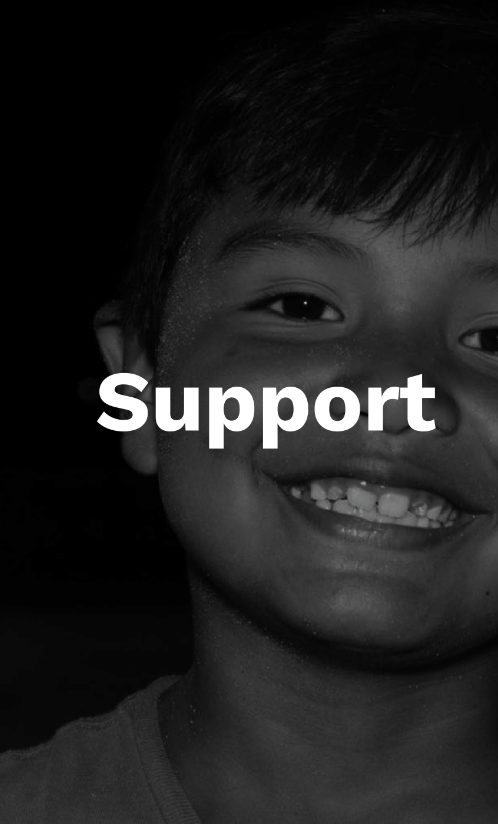


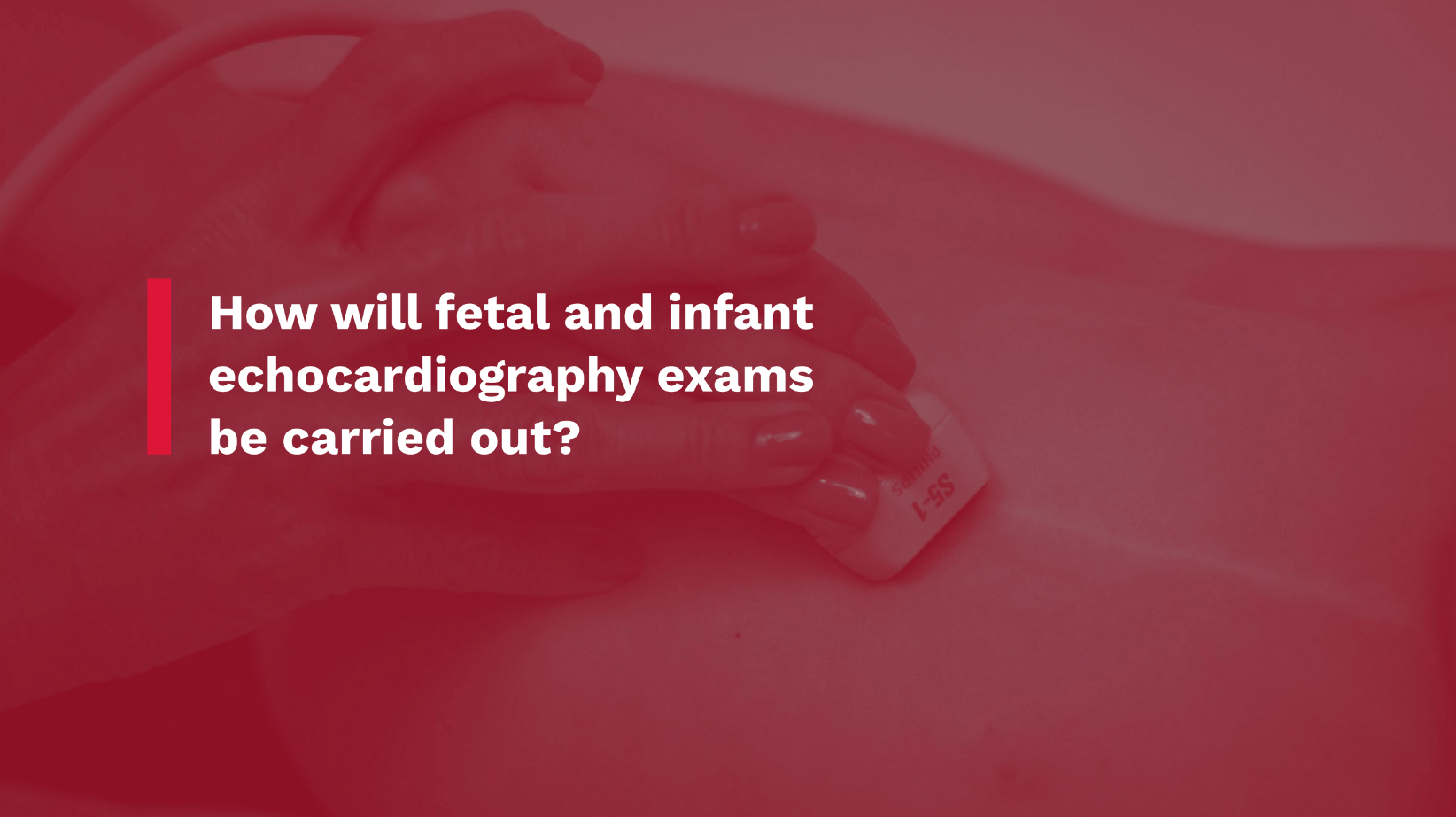
What is Congenital Heart Disease
Congenital heart disease refers to any abnormality in the structure or function of the heart that occurs during the first eight weeks of pregnancy when the baby’s heart is forming. It occurs due to a disturbance in the embryonic development of the cardiac structure, even if it is discovered at birth or years later. According to data from the Brazilian Society of Cardiology, approximately 29,000 children are born with heart problems in Brazil each year, meaning that out of every 100 live births, one baby is born with a heart defect. Of these, around 80% will require some form of cardiac surgery during their evolution.
Congenital heart disease can cause symptoms at birth, during childhood, or only in adulthood. In some cases, congenital heart disease does not cause any symptoms. There are different types of heart disease, ranging from mild and only discovered in adulthood, to more severe forms, such as cyanotic heart disease, which can cause blood flow abnormalities to the body.
How the Exam is Performed:
The echocardiogram is an exam performed using an ultrasound device. The device captures sound waves and transforms them into images. To perform the echocardiogram, the patient will be positioned on its back, and then a specialized cardiologist will slide a transducer with gel over the patient’s chest to visualize all parts of the heart. The gel makes visualization easier, is water-based, and does not cause any skin allergies. At times, slight pressure may be applied to facilitate the visualization of the organ and the functionalities that need to be tested, without causing pain or discomfort to the patient. The rocedure typically takes about 20 minutes. However, the steps may vary depending on the type of echocardiogram.
Preparation for the Echocardiogram:
In general, no preparation is required before the exam.
Equipment:
The equipment to be used is the ultrasound (images are merely illustrative). They look like a notebook, but are powerful, precise, and reliable. Depending on the configuration, it can cost up to 200,000 reais.
Contraindications:
There are no contraindications for performing an echocardiogram. No pain or side effects!
How the Fetal and Infant Examination will be conducted:
• Patients will be attended in order of arrival;
• They will be identified on the echocardiography equipment and in a form with their name, age, village, height, weight, parents’ names, and if there are any symptoms;
• Each exam should have a minimum of 12 heart capture images with the necessary measures;
• If we find patients with altered hearts, parents will be called along with the Chief or leaders, and the doctor will provide a detailed explanation, directing the patient to the necessary steps;
• The exams will only be downloaded from the equipment upon return to São Paulo, placed in the system, and made permanently available to the patient through the website;
• At the end of the exam, the child will receive a card with the following information: that they underwent a cardiological evaluation with echocardiography and electrocardiogram.
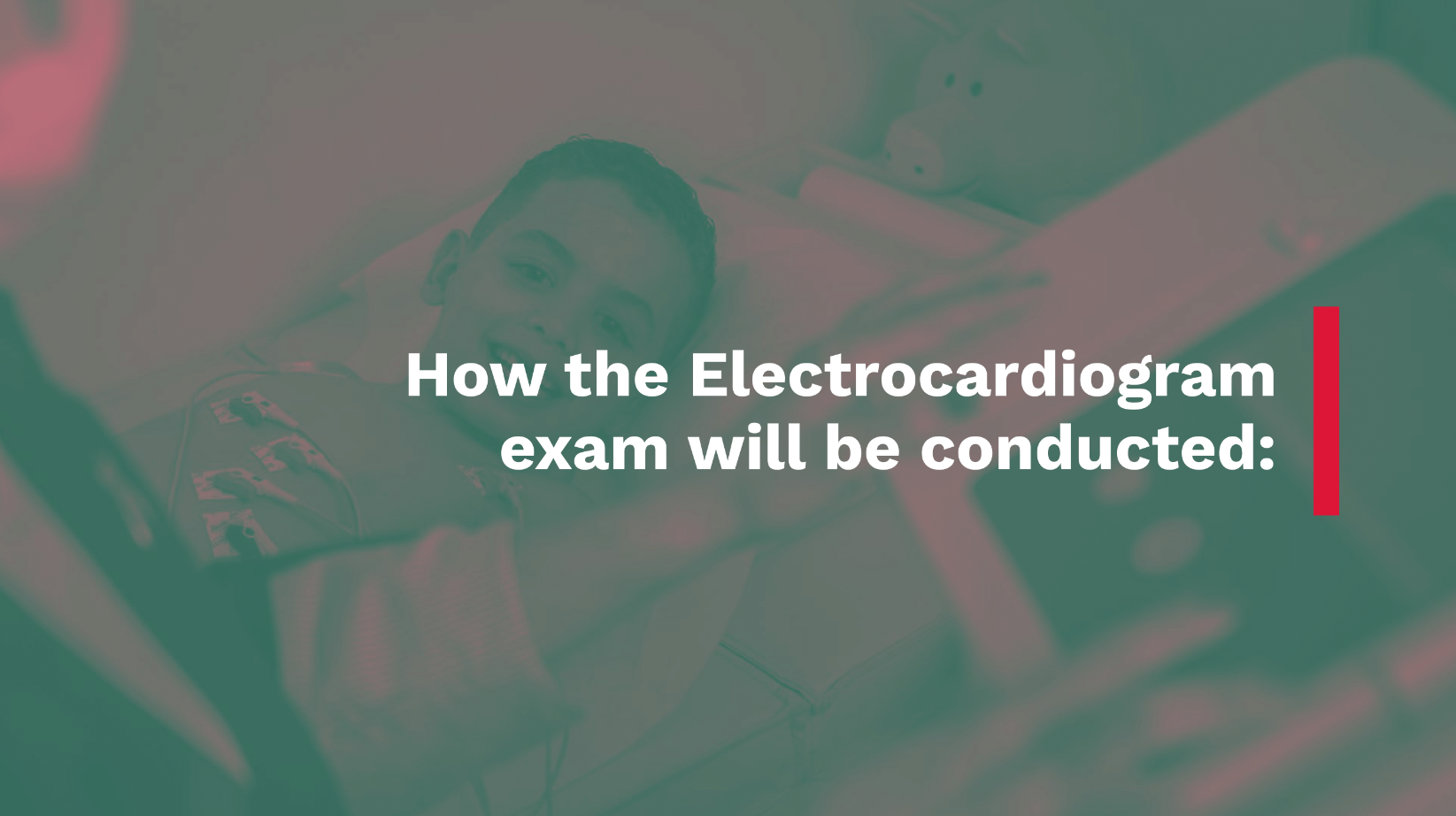
Electrocardiogram (ECG) is an exam that records the electrical activity originating from the heart, captured through the placement of electrodes applied to the patient’s skin and displayed in graphical format.
What is the Electrocardiogram for:
The Electrocardiogram is an initial exam for evaluating cardiovascular health, aimed at detecting some heart abnormalities. Also known as ECG, it is also requested by cardiologists to monitor the progression of some diseases, as well as to evaluate the effectiveness of medications for arrhythmia or pacemakers.
Preparation for the Electrocardiogram exam:
In general, no preparation is necessary before the exam.
Service:
It serves all ages and both sexes.
Contraindications:
There are no contraindications for the Electrocardiogram exam.
ARE YOU A DOCTOR?
Sign up in the form below to understand how you can help the project and be part of this cause!
ARE YOU A COMPANY OR INDIVIDUAL?
Help us raise funds to encourage the project and make a difference in the world!
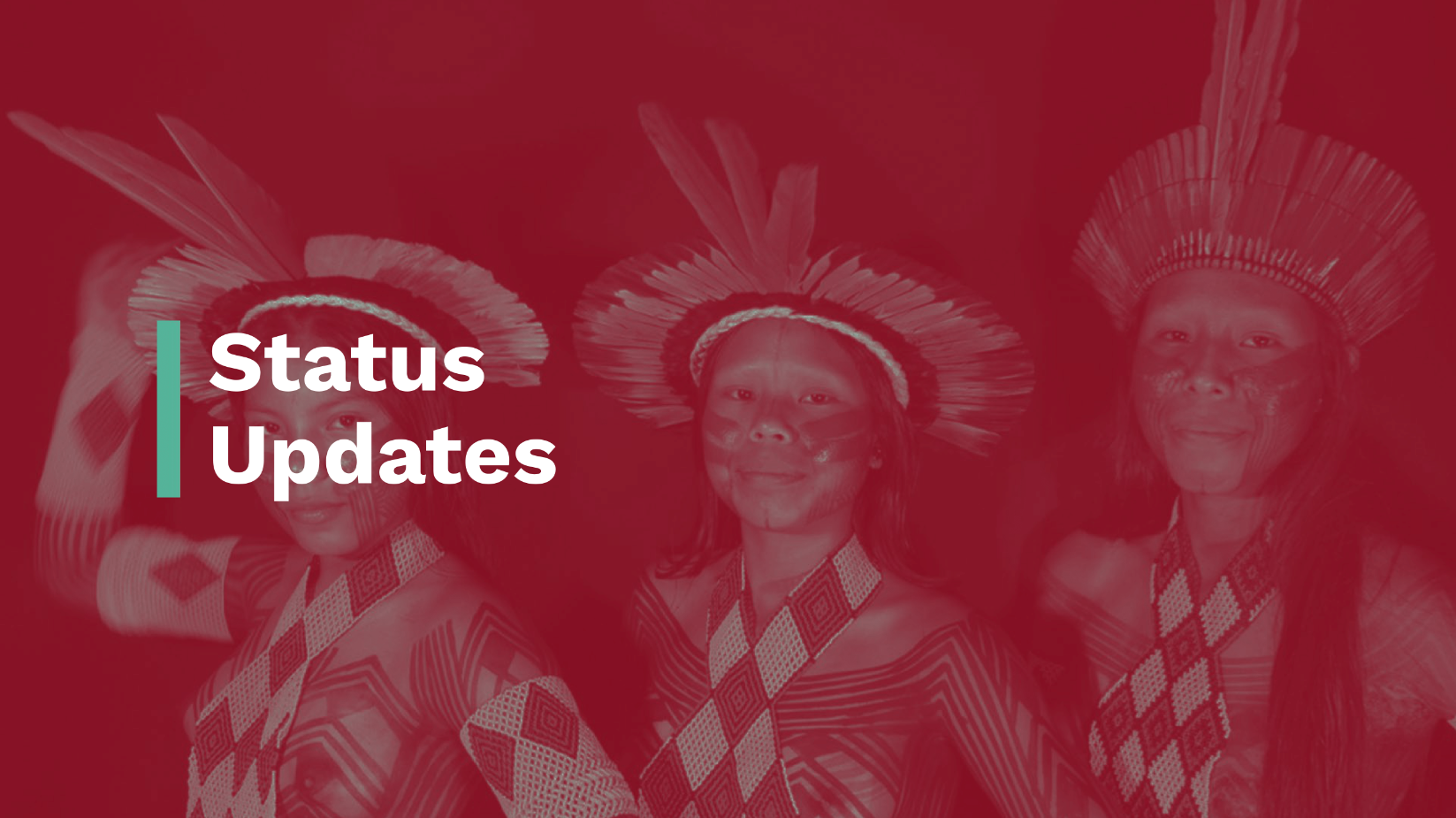

Feb, 3 - 2023
During an informal lunch with Minister of Indigenous Peoples Sonia Guajajara, I presented the project “In the Heart of Brazil”. Immediately, the Minister instructed her assistant Ana Patté to forward the project to the appropriate parties.

Feb, 4 - 2023
At an event for the Pre-March of Indigenous Women, I presented the project “In the Heart of Brazil” to Puyr Tembé, former president of the State Federation of Indigenous Peoples of Pará and now Secretary of Indigenous Peoples of the State of Pará, who immediately supported the project.

Feb, 5 - 2023
I was introduced to Dr. Putira Sacuena from the Indigenous Health Secretariat of the State of Pará. After presenting the project, it was approved by her with great enthusiasm to put it into practice, especially in the Mudurucu, Kayapo, Parakana, and Xicrin do Catete villages, where illegal mining is present. As some villages are difficult to access, she raised the possibility of providing internal transportation by car, boat, and airplane, as well as food, lodging, and security, and the need to call upon the National Force.

Feb, 5 - 2023
Welcomed by the lawyer, indigenous activist, and Indigenous Health Secretary of SESAI (Special Secretariat for Indigenous Health), who, after reading the project, forwarded it to the responsible party.

Feb, 05 - 2023
Chief Pepkrakte Konxarti and his wife, indigenous activist Concita Söpré, from the Kyikatege village, where we will make the first incursion of the project, from May 07 to May 13, 2023.

March, 21 - 23
With the General Coordination of Management and Legal Team of SESAI, who defined: for each incursion, the medical team must undergo training on the ethnic group to be visited and will provide me with a position by the end of the month.

March, 21 - 23
Anna Patté, Parliamentary Advisor to Minister Sônia Guajajara, who said: It’s a done deal!

Curriculum Dra. Lilian Lopes
Lilian Lopes, born in Santo, SP, on April 2, 1958. Married, holder of identity card number 9576707-1 and CPF 891 459 928 – 00. Address: Alameda Santos, 211, Conjunto 1307, Paraiso – CEP 01419 000, São Paulo – SP. Phone: 3254 1010 / 5084-0825.
From 1976 to 1981, Dr. Lilian attended the School of Medical Sciences of Sorocaba at the Pontifical Catholic University of São Paulo, Sorocaba. Medical License – CRM 42497. Graduated on December 11th, 1981.
From 1980 to 1981, she completed a voluntary internship at the Intensive Care Unit of the Sociedade Beneficência Portuguesa de São Paulo-Hospital São Joaquim, and in the Cardiac Surgery Service of Professor Dr. Adib Jatene.
Between 1982 and 1983, she completed a Medical Residency at the “Dante Pazzaneze” Institute of Cardiology in the state of São Paulo, obtaining a Specialist Certificate in Cardiology (conferred by the medical residency commission in accordance with law 6.932/81).
In 1984, she obtained a Certificate of Improvement in Pediatric Cardiology, as a Medical Resident at the “Dante Pazzaneze” Institute of Cardiology in the state of São Paulo.
From August to December 1985, she was a medical intern in the Pediatric Cardiology Department at The Children’s Hospital of Harvard Medical School/Boston, under the supervision of Dr. Bernard Nadal and Dr. Aldo Castaneda. During the same period at the same university, she
took a course in Pathological Anatomy with Dr. Richard Van Praagh and Dr. Stella Van Praah and a course in pediatric Eco-Doppler Cardiology with Dr. Stephen Sanders.
From January to December 1986, she was a research fellow in the Pediatric and Fetal Echocardiography laboratory at the CardioVascular Research Institute of the University of California/San Francisco, under the supervision of Dr. Norman H. Silverman.
In 1987, she began her research activities in echocardiography and fetal cardiology as a research physician at the Obstetrics Clinic of FMUSP and was hired as an assistant physician by the Foundation for the Faculty of Medicine of USP in January 1992, a position she has held to the present day.
In July 1989, she did an update internship in pediatric and fetal echocardiography at the University of California/San Francisco, under the supervision of Dr. Norman H. Silverman.
In August 1989, she was invited to take over the direction of the Pediatric and Fetal Echocardiography Service at the Beneficência Portuguesa de São Paulo Society – Hospital São Joaquim, where she still works to this day.

May 03, 1991
Cardiology Specialist title conferred by the Brazilian Medical Association and the Brazilian Society of Cardiology.
November 01, 1991
Echocardiography Specialist title conferred by the Echocardiography Department of the Brazilian Society of Cardiology.
December 12, 1994
Echocardiography Certification conferred by the Brazilian Medical Association, the Brazilian Society of Cardiology, and the Echocardiography Department.
February 1995
Dr. Lilian founded the ECOKID clinic.
May 24, 1995
She was approved with "Honors" in her doctoral thesis defense in the Obstetrics and Gynecology concentration area, presented at the Faculty of the University of São Paulo, on "FETAL TACHYARRHYTHMIAS.'I
December 17, 1998
Pediatric Cardiology Habilitation title (by proficiency), conferred in accordance with the determination of the Parity Commission of the Pediatric Cardiology Department of the Brazilian Society of Cardiology and the Cardiology Department of the Brazilian Society of Pediatrics.
Head of the Fetal Cardiology Department at the Obstetrics Clinic of FMUSP for 28 years, the first Fetal Cardiology service in the country.
2015
In 2015, Dr. Lilian founded the Lilian Lopes Institute
ARE YOU A DOCTOR?
Sign up in the form below to understand how you can help the project and be part of this cause!
ARE YOU A COMPANY OR INDIVIDUAL?
Help us raise funds to encourage the project and make a difference in the world!


